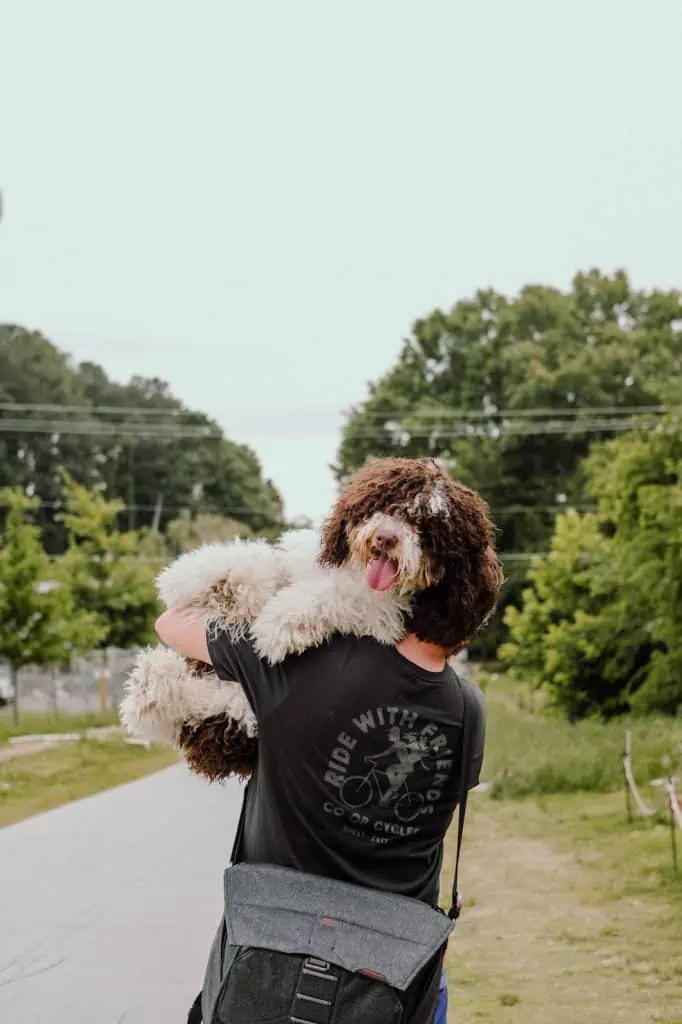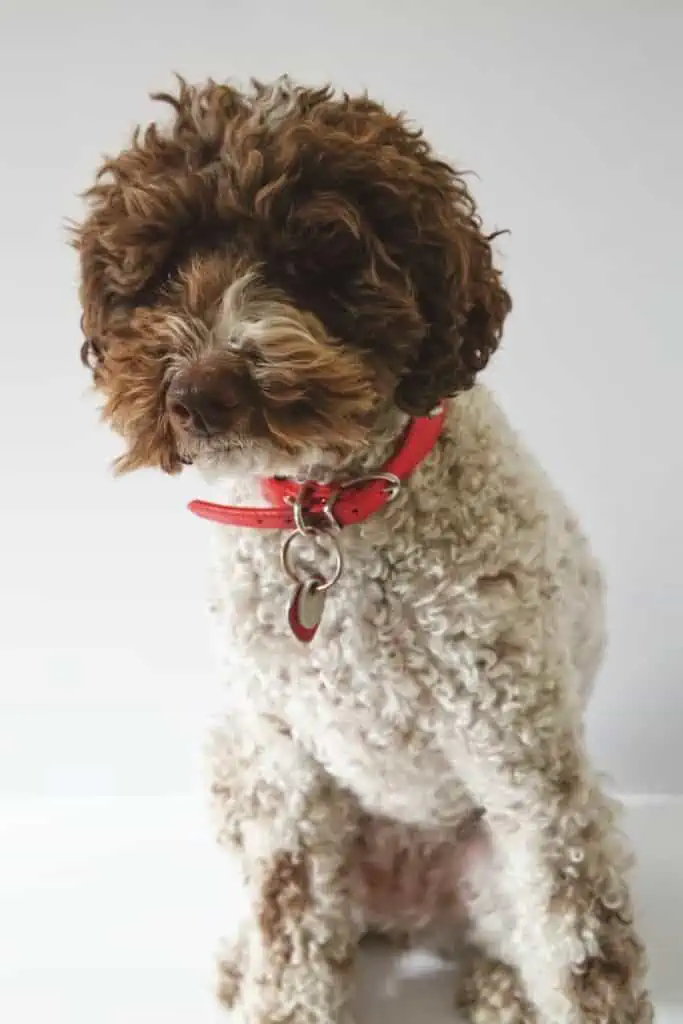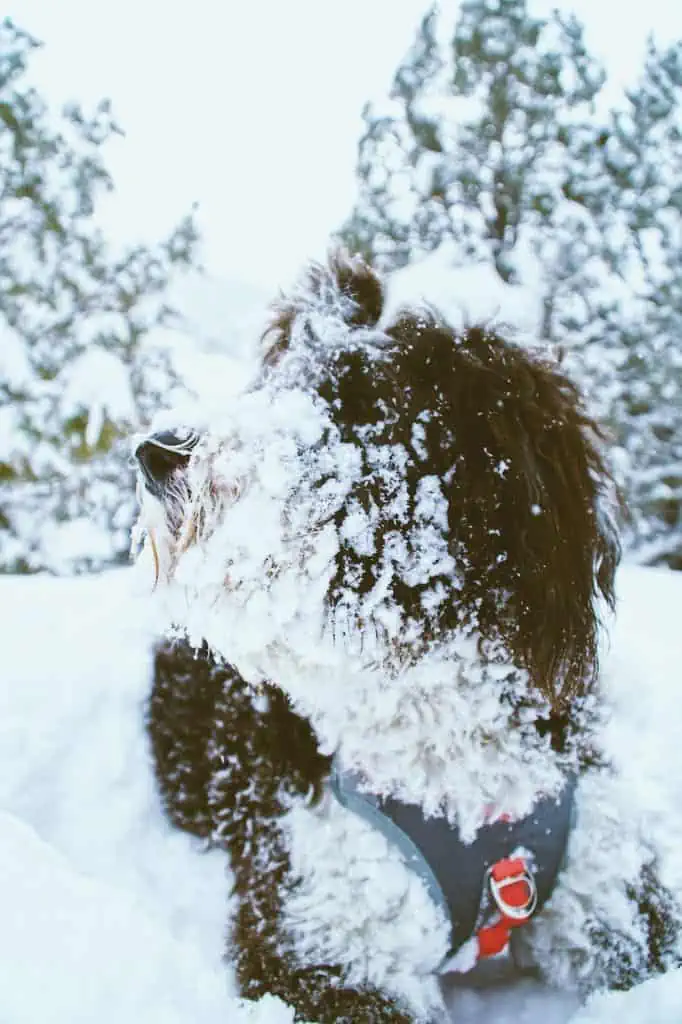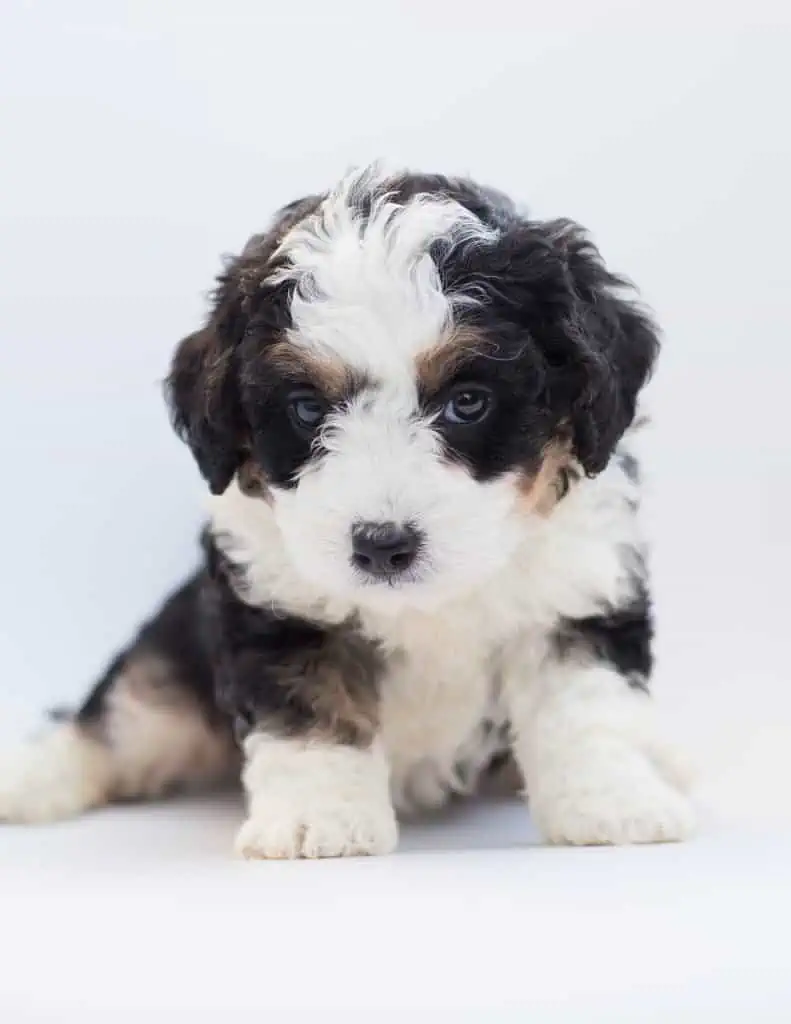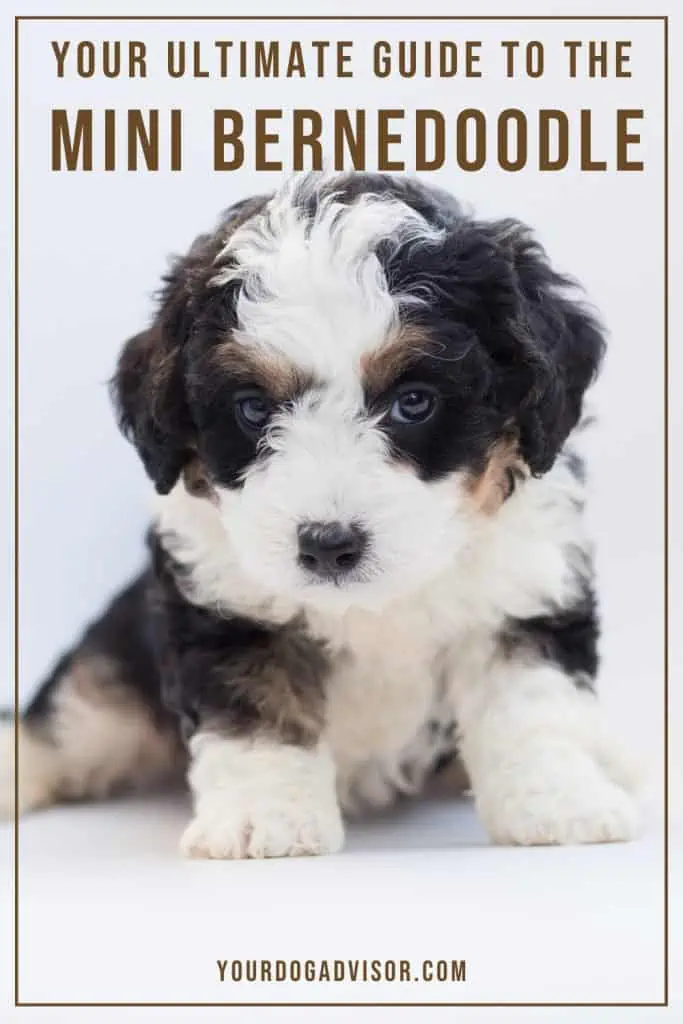Are you head over heels for the Bernedoodle but lacking in the space it takes to maintain one of these large breed mixes? Never fear, because the Mini Bernedoodle has arrived!
This miniature version of the standard Bernedoodle packs everything you already know and love about the Bernedoodle dog into a smaller package that is perfect for those wishing they could bring this curly cutie home.
But what exactly are you getting into if you invest in a Mini Bernedoodle, and is this adorable mixed breed really the right addition to your home or family? That’s what we’re here to find out!
Contents
The Mini Bernedoodle – A Brief Overview
The Mini Bernedoodle is the smaller version of the standard Bernedoodle.
The Mini Bernedoodle is everything you already know and love about the standard Bernedoodle, just miniaturized!
Whereas the fluffy Bernedoodle is a cross between the Bernese Mountain Dog and the Standard Poodle, the Mini Bernedoodle is a mix between the Bernese Mountain Dog and the Miniature Poodle.
But in order to understand the Mini Bernedoodle better, it helps to take a closer look at its parent breeds.
Meet The Miniature Poodle
The Miniature Poodle is a smaller variation of the purebred Poodle, standing between 10 and 15 inches tall and weighing around 10 to 15 pounds.
Regardless of their size, Poodles are famous for their athleticism, intelligence, outgoing nature, and family-friendly demeanor.
Poodles are also popular because they are healthy, long-lived, and hypoallergenic. This means that their coats do not shed and they produce much less allergy-inducing dander in their fur, making them excellent dogs for those who suffer from allergies.
Because of their winning temperaments and hypoallergenic coats, Poodles are also some of the most popular dogs used when creating crossbreed dogs like the Mini Bernedoodle.
Meet The Bernese Mountain Dog
The Bernese Mountain Dog makes up the other half of this winning combination when it comes to the Mini Bernedoodle. This purebred dog is a large breed dog standing between 23 and 27 inches tall and weighing between 75 to 120 pounds.
Bernese Mountain Dogs have a thick, double coat that sheds profusely, especially during the shedding season in spring and fall. Temperamentally, these dogs are incredibly devoted to their owners. They are sweet-natured, gentle, and can do wonderful in homes with families and active singles or seniors.
Their very large size may mean that they are more prone to suffering from certain health issues that can be somewhat costly, but overall these dogs make fabulous companions for a variety of owners.
The Mini Bernedoodle Overview
Standing between 18 to 22 inches tall and weighing around 25 to 49 pounds, the Mini Bernedoodle is about half the size of its standard Bernedoodle counterpart, making it a much more compact and travel-friendly companion that is better equipped for homes with smaller yards or less indoor space.
With all that said, there is very little else that changes about the Mini Bernedoodle’s appearance, temperament, and health, making it the ideal miniaturization of one of the world’s most beloved crossbreeds.
Of course, that doesn’t mean that the Mini Bernedoodle is the perfect pet for every home or owner. In fact, crossbreed dogs are still considered somewhat controversial, and it’s important to understand what you’re getting into when considering getting into owning a hybrid dog.
Keep reading to learn more.
The Mini Bernedoodle And The Crossbreed Controversy – What You Should Know
The Bernedadoodle is a hybrid dog, and hybrids are somewhat controversial.
Although crossbreed dogs are nothing new, their popularity has skyrocketed over the last few decades, especially here in the United States. Also known as mixed breeds, designer dogs, or hybrid dogs, a crossbreed dog is a dog that is the offspring of two specifically chosen purebred parents.
There is some controversy surrounding the idea of “designer dogs” and whether or not these dogs are simply glorified mutts. However, many supporters of crossbreeding are quick to point out that mutts have a variety of different breeds in their DNA while crossbreed dogs come from only two specific parent breeds.
Supporters also point out that, again, crossbreed dogs are nothing new. In fact, the practice of crossbreeding has been going on for as long as the human/canine relationship, and most purebred dogs we are familiar with today are the result of crossbreeding over generations.
However, it wasn’t until recently that newer generation crossbreed dogs like the Bernedoodle have become popular as companion dogs, with many hybrid dogs being sold by breeders for just as much (and sometimes more) than their purebred counterparts.
But the crossbreed controversy doesn’t stop there. One of the main issues with crossbreed dogs has to do with predictability when it comes to appearance, temperament, and health.
With purebred dogs, we are able to better predict certain traits and aspects, whereas with crossbreed dogs, and especially newer generation crossbreed dogs, predicting specific genetic traits is nearly impossible.
This means that anyone considering investing in a crossbreed dog should understand that they may not be able to completely predict what their dog looks like, the type of coat he will have, how tall he will grow, what his temperament will be like, or if he will be more prone to certain health problems over others.
It should also be noted that crossbreed dogs are not recognized by most major breed clubs, including the American Kennel Club (AKC). This means that while you may be paying a premium price for your designer dog, you will not be able to register him with the AKC and he will not be eligible for show.
Of course, most people interested in a Mini Bernedoodle are interested in these dogs solely for companionship. So, without further ado, let’s learn more about what you can expect when expecting a Mini Bernedoodle.
Let’s Start With The Lifespan And Health Issues Of A Mini Bernedoodle
Mini Bernedoodles have a good lifespan of between 14 and 17 years.
While there are some controversies surrounding crossbreed dogs like the Mini Bernedoodle, there are also some benefits that come with investing in a crossbreed dog.
One of these benefits is known as hybrid vigor, which is a term used to explain the potential for mixed breeds to be healthier than their purebred offspring.
The idea behind this is that purebred dogs have been overbred for generations in an effort to maintain their breed standard, and this overbreeding often leads to a smaller gene pool that makes purebred dogs more susceptible to certain genetic health issues.
Crossbreed dogs, on the other hand, have a widened gene pool and therefore may be less likely to suffer from the specific genetic health issues of their parent breeds.
With all that said, it’s still important to remember that crossbreed dogs can still be prone to the same genetic health issues as their purebred parents, but there are some that the Mini Bernedoodle may be more susceptible to than others.
With a lifespan of between 14 and 17 years, the Mini Bernedoodle is considered a long-lived and hardy dog. However, he can be prone to a number of health issues you should be aware of, including
- Skin Issues
- Allergies
- Hip Dysplasia
- Elbow Dysplasia
- Ocular Disease
- And Gastric Dilation Volvulus (AKA GDV or Bloat)
Preventing all health issues in your Mini Bernedoodle may be impossible, however, there are some steps you can take to reduce the risk of certain health problems and to better ensure your Mini Bernedoodle lives his longest, healthiest life.
First, make sure you obtain your Mini Bernedoodle from a reputable source such as a qualified breeder or shelter you trust. Mini Bernedoodles can be costly, and they are also highly sought after. This means that there are likely going to be people selling Mini Bernedoodles irresponsibly in an effort to make a quick buck.
If you go through sources that are not responsible and that are not practicing responsible breeding practices, you are going to be more likely to wind up with a sick puppy down the road.
Next, make sure you are investing in your Mini Bernedoodle dog’s diet. A quality dog food can help reduce health problems like obesity and allergies, and can even ensure bone, joint, and heart health throughout your dog’s life.
We also recommend investing in a good groomer for your Mini Bernedoodle. These dogs often have long, wavy hair that can be prone to matting and tangles, and improper grooming can lead to worsened skin issues and allergies.
You should also make sure you find a good veterinarian you trust and that you keep routine vet appointments. You might also consider having your Bernedoodle health screened at an early age and investing in pet health insurance.
We will talk more about proper grooming practices and diet further down, but for now, let’s dive into the Mini Bernedoodle’s temperament.
Keep reading
The Mini Bernedoodle And Children – Is This A Good Family Dog?
Mini Bernedoodles make excellent dogs for families and children.
When it comes to great family dogs, the Mini Bernedoodle is certainly a winner. This dog has a sweet, devoted, and playful temperament perfect for families with children and other pets.
The Mini Bernedoodle does especially well in households with children because they are not as large as the standard Bernedoodle, so they are less likely to overwhelm youngsters with its size.
However, these are not the most laid back of hybrids. Mini Bernedoodle dogs are active and adventurous, and they do best with owners who are willing and able to get up and get outside with them.
They also do best in homes with at least a bit of yard space and owners who can devote time and attention to training, socialization, and affection.
The Poodle side of your Mini Bernedoodle means that he will likely be athletic and enjoy games of fetch and long walks, while the Bernese Mountain Dog side of your Mini Bernedoodle means he will likely become very attached to his family and will want to be included in all the family activities.
These qualities could also mean that your Mini Bernedoodle could suffer from separation anxiety if left home alone for too long, and this anxiety could lead to destructive behaviors like chewing or barking.
You can help combat behavioral issues like these by making sure your dog has plenty to do while you are away and by making sure he is properly exercised before you have to go somewhere.
Tips On Exercise, Training, And Socializing A Mini Bernedoodle
Training and exercise can help reduce health and behavioral issues for your Mini Bernidoodl.
Exercise is incredibly important not only to combat potential behavioral issues in your Mini Bernedoodle but also to combat potential health issues.
Though he is not as large as the standard Bernedoodle, the Mini Bernedoodle is still going to require a good amount of exercise each and every day to stay healthy and happy.
The ideal amount of exercise for a Mini Bernedoodle is going to include a good walk or two each day as well as some free playtime in the backyard. A well-socialized Mini Bernedoodle may also enjoy some free playtime at a dog park with other dogs of his same height and weight.
Mini Bernedoodle dogs are naturally athletic, thanks to their Poodle parent’s DNA, and this could mean they may be prone to pulling ahead during walks. If this is the case, we suggest investing in quality walking equipment like the no-pull harness below.
2 Hounds No Pull Freedom Harness
No products found.
The 2 Hounds No Pull Freedom Harness is a front clip dog harness that is ideal for large breed dogs and is designed to not only help stop pulling but also make walking more comfortable for both you and your dog.
The harness works by fitting snugly and naturally, and it redirects your dog back to you if he pulls ahead.
Along with making sure you’re exercising your Mini Bernedoodle properly, it’s also important to implement proper training and early socialization.
Training should begin as early as possible, often during puppyhood, and it should continue on throughout your dog’s lifetime.
Mini Bernedoodles are highly intelligent and trainable, so training should be a breeze. It’s important, of course, to use positive reinforcement when training a Mini Bernedoodle, as these dogs are also very sensitive and any scolding or other aversive training methods could cause your dog to shut down.
Make sure you use plenty of treats and praise when training, and keep training short, gamelike, and fun.
Socializing can also go hand-in-hand with training sessions and should be taken just as seriously but implemented just as gently.
The Mini Bernedoodle can be prone to struggling with anxiety, and you can help reduce anxiety by ensuring you are socializing your Mini Bernedoodle at an early age and introducing him to as many new experiences, people, places, and things as possible.
Grooming, And Diet – Why This Matters
Grooming can help reduce skin issues and matting.
Because the Mini Bernedoodle is a crossbreed dog, you may not be able to predict which type of coat he will inherit from his parent breeds.
In fact, the Mini Bernedoodle could have a hypoallergenic coat like his Poodle parent or he could have a shedding coat like his Bernese Mountain Dog parent. Or, he could have a coat that falls somewhere in between.
Most Mini Bernedoodle pictures you see online are later generation crossbreeds, which means their coat types are going to be more predictable. If you are looking for a hypoallergenic Mini Bernedoodle, it’s best to seek out one that is the second or third generation to ensure its coat is a particular way.
With all that said, most MIni Bernedoodle dogs have coats that can grow out long and be prone to matting. This means they will need routine brushing with detangling combs to help reduce tangles and skin problems from developing.
We Love Doodles Pet Dematting Comb
No products found.
A good brush to help keep your Mini Bernedoodle’s coat healthy and tangle-free is the above pet dematting comb by the We Love Doodles store. This comb is designed for detangling difficult fur and can be used for dogs with shedding coats or hypoallergenic coats.
It also has a double-sided design that includes rounded ends so it is more comfortable for your dog and will not rip his fur.
Along with investing in a good dematting comb for brushing, your Mini Bernedoodle is also going to need to be bathed every three to six weeks. Use a quality dog shampoo for dogs with sensitive skin, and be careful not to over-bathe your dog as this can lead to more pronounced skin problems down the road.
Like all dogs, the Mini Bernedoodle should also have his ears kept clean, his nails trimmed, and his teeth brushed.
While grooming can help keep your Mini Bernedoodle’s skin and coat healthy, diet will also play a large role in reducing skin issues.
Remember, the Mini Bernedoodle can be prone to suffering from skin issues and allergies, so a dog food made with quality ingredients for dogs with sensitivities can help promote skin health in the long run.
We suggest a dog food specified for your Mini Bernedoodle’s age, weight, and activity level, and a dog food that is made with real salmon, beef, or lamb as opposed to dog food with poultry, as chicken or turkey can sometimes exasperate allergies.
Because the Mini Bernedoodle can also be prone to suffering from digestive issues like GDV or Bloat, you might also consider investing in a slow feeder. Slow feeders can help reduce the amount of air swallowed by your Mini Bernedoodle during meals, which can in turn stop Bloat from occurring.
Is The Mini Bernedoodle Right For You? Here’s How To Find One!
The Bernedoodle can be costly, but it’s important not to try to cut corners.
The Mini Bernedoodle is an incredibly popular dog, and it’s easy to see why once you learn more about him!
He is family-friendly, potentially hypoallergenic, playful, and sweet-natured.
However, this dog is also highly sought after and difficult to come by, making it easy for breeders to charge a premium price for this adorable pup.
In fact, if you have your heart set on a Mini Bernedoodle dog, be prepared to spend anywhere between $1,000 to $5,000!
Of course, as we mentioned above, it’s important not to try and cut corners when looking to obtain a Mini Bernedoodle puppy. Instead, make sure you take your time and do plenty of research so you can find a breeder you trust.
Look for breeders with experience in breeding Mini Bernedoodles, and don’t be afraid to ask for references and a certificate of health when it comes time to bring your Mini Bernedoodle home.
We hope this has been a helpful guide on this adorable hybrid! Now we want to hear from you. Are you considering investing in the MIni Bernedoodle? Tell us in the comment section below.
Thanks for reading!


Jen Jones is a professional dog trainer and behavior specialist with more than 25 years of experience. As the founder of ‘Your Dog Advisor’ and the ‘Canine Connection’ rehabilitation center, she applies a holistic, empathetic approach, aiming to address root causes rather than merely treating symptoms.
Well known for her intuitive and compassionate approach, Jen adopts scientifically-proven, reward-based methods, encouraging positive reinforcement over punishment. Jen specializes in obedience training, behavior modification, and puppy socialization. Her innovative methods, particularly in addressing anxiety and aggression issues, have been widely recognized. Jen has worked with many of the world’s leading dog behaviorists and in her free time volunteers with local animal shelters and rescue groups.
